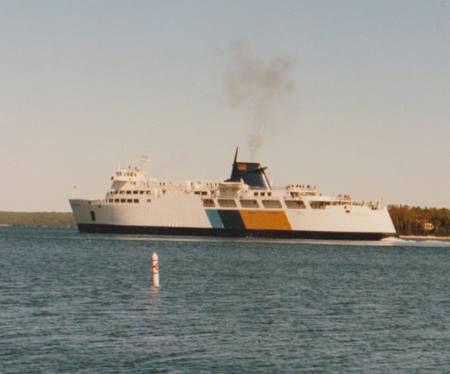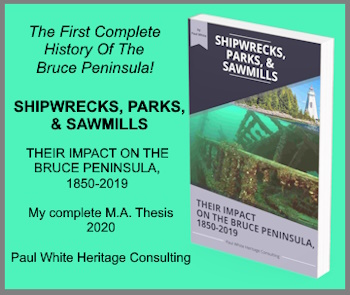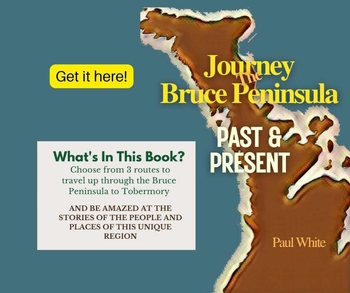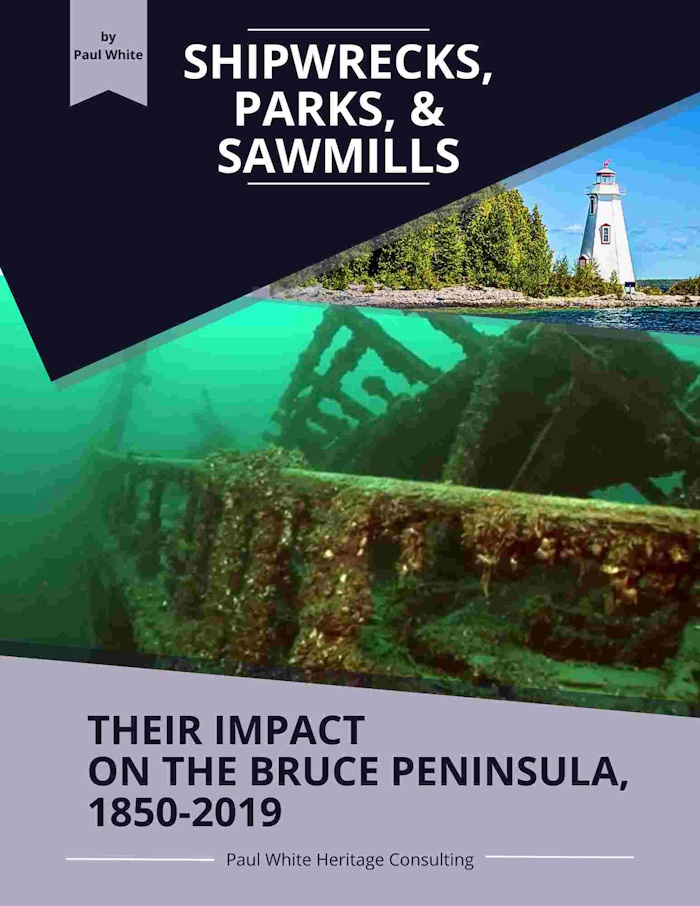Georgian Bay Ferry Boat Service
Spring time marks the beginning of the ferry boat service when "the Big Canoe," also known as the Chi-Cheemaun leaves her winter berth in Owen Sound harbour.
She heads to Tobermory for another season of shuttling cars and
passengers between the Bruce Peninsula and Manitoulin Island.
For more than a century, ferry boat service has been an important part of the region's economy.
Ferry Boat Service Starts as Part of a Railway
However, in the beginning, the idea of ferry connection between the Bruce Peninsula and Manitoulin had nothing to do with cars and highways. Instead, the idea was that a system of ferry boats could provide a railway link to the North Shore.
Francis Hector Clergue, whose entrepreneurial talents led to the development of the Algoma Steel Company in Sault Ste. Marie, in 1901 envisioned a railway connecting the Bruce Peninsula with Manitoulin and the North Shore of Georgian Bay. In 1899, Clergue attained the charter for the Manitoulin and North Shore Railway. The next year, 1900, he obtained the necessary charter to allow a link between Manitoulin Island and the Bruce Peninsula. Unfortunately, despite the appeal of a shorter route to Toronto, Clergue's idea never got past the drawing board.
The concept of a ferry system for the region did not die. In 1917 John Tackaberry, a Lion's Head businessman, purchased the steamer, Henry Pedwell, and started a car ferry operation between the peninsula and Manitoulin Island.
Tackaberry owned an automobile dealership in Lion's Head and wanted the ferry system not only for transporting car travelers, but also for delivering new cars to customers on the North Shore.
In the mid-1920s, Tackaberry sold the Pedwell and replaced it with the Alice which he refitted to carry automobiles.
In 1928 he sold the Alice to the Dominion Transportation Company which renamed her the Hibou. That same year, 1928, Tackaberry's new vessel, the Island Princess, began the first regularly scheduled service between Tobermory and South Baymouth.
Tackaberry's company was not the only group interested in a ferry service to the North Shore. In 1921, a group of Owen Sound businessmen which included Captain Norman McKay formed the Owen Sound Transportation Company. A decade later, in 1931, this company received a charter from the Ontario government to establish a regular ferry service between Tobermory and South Baymouth.
That summer the Owen Sound Transportation Company put the Kegawong into service on the line.
The Kegawong already had a history as a ferry boat in the area. It had been previously owned by Tackaberry and had sailed under the name Henry Pedwell.
The company charged a fare of $3 for passengers and, depending upon the wheel base, $4.70 to $5.70 for cars.
In 1930, the Owen Sound Transportation Company purchased another vessel which they planned to use in service to the North Shore. The ship was the American fire tug, James R. Elliott, built in 1902 in Port Huron, Michigan. The Owen Sound company sent the Elliott to Midland's Georgian Bay Shipbuilding Company to be refitted, at a cost of $80,000 for summer ferry use and passenger and freight service.
When it left drydock, 125-foot diesel was re-named Normac, in honour of Norman McKay. It had a capacity for 66 passengers, who paid a one-way fare of $2.00 or $3.50 return; 18 cars which, depending upon wheel base were charged $4 or $5, and 200 tons of freight.
The Normac sailed between Owen Sound and Sault Ste. Marie during the 1931 sailing season. The next year, 1932, it began twice a day round trip service between Tobermory and South Baymouth. The Normac left Tobermory at 12:00 noon and 6:00 p.m. and made return trips from Manitoulin at 9:00 a.m. and 3:00 p.m. each day.
Prior to 1931, the ferry service between the Bruce Peninsula and Manitoulin Island was sporadic and, in reality, more of a packet line. However, it seems the granting of a ferry boat charter to Owen Sound Transportation Company marked the true beginning of the regular ferry system which continues to this day as the Chi-Cheemaun plies the waters between Manitoulin Island and Tobermory every summer day..
More Georgian Bay Sailing Stories
Lighthouses were vital to Georgian Bay and Great Lakes sailing traffic. They assisted mariners in making their sailing a safe venture.
Recreational Boating on Georgian Bay There is a long tradition of recreational boating on Georgian Bay. Reports indicate that regattas were being held at Owen Sound as early as 1852.
Great Lakes Recreational Boating Great Lakes recreational boating has been a popular pastime in the summertime in the Georgian Bay region for many years.
Yachts on Georgian Bay A history of yachts on Georgian Bay.
Georgian Bay Ferry Boat Service between Tobermory and Manitoulin Island has a history that is more than a century old. Today, the Chi-Cheemaun continues that tradition.
Ferry boat service after 1930 increased in activity between Tobermory at tip of the Bruce Peninsula and Manitoulin Island
1867 Election Meant Sailing to the Soo. There was only one polling station in the Georgian Bay region in the first election after Canadian Confederation and that was in Sault Ste. Marie!
A Flowerpot Island boat trip takes you to one of the many Georgian Bay islands dot the landscape of the waters around Tobermory at the tip of the Bruce Peninsula. One island features not only unique landforms and vegetation, but also a mysterious indigenous Romeo and Juliet tale of romance.
Chicora the first stage of an 1871 Great Lakes tour aboard a cruise ship on Georgian Bay.
Chicora the final stage of an 1871 cruise a foggy voyage on the Great Lakes.
Historic Vacations: King's Royal Park Historic Vacations: King's Royal Park, opulent adventures for the wealthy of the day. It was the late 19th century and tourism was beginning to bloom.
Sailing the Lake Huron Shoreline is a step back in history and a delightfully scenic trip. But beware of the big waves that can arise anytime!
Sailing Lake Huron Shoreline Part 2 takes us through the most treacherous part of our voyage and also a most interesting part as we visit some unique islands.
Georgian Bay Sailing Georgian Bay Sailing history is a rich tapestry of tales of heroism, tragedy, and exploration. Sailing vessels traversing the rugged waters of Georgian Bay predate the arrival of European explorers and settlers.
Boating for Recreation on Georgian Bay and beyond had an early start once settlement began in the region. As early as the 1850s pleasure crafts were popular.






